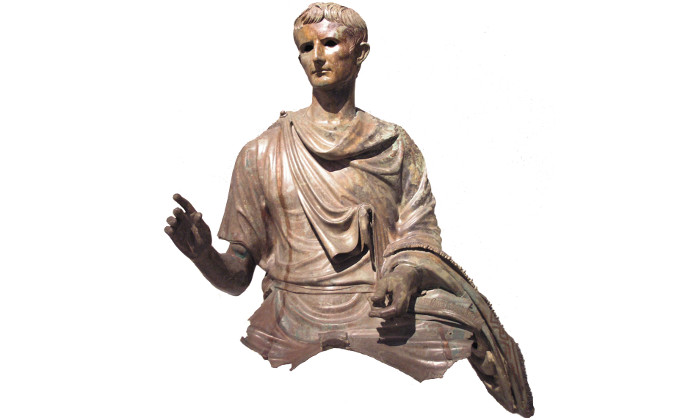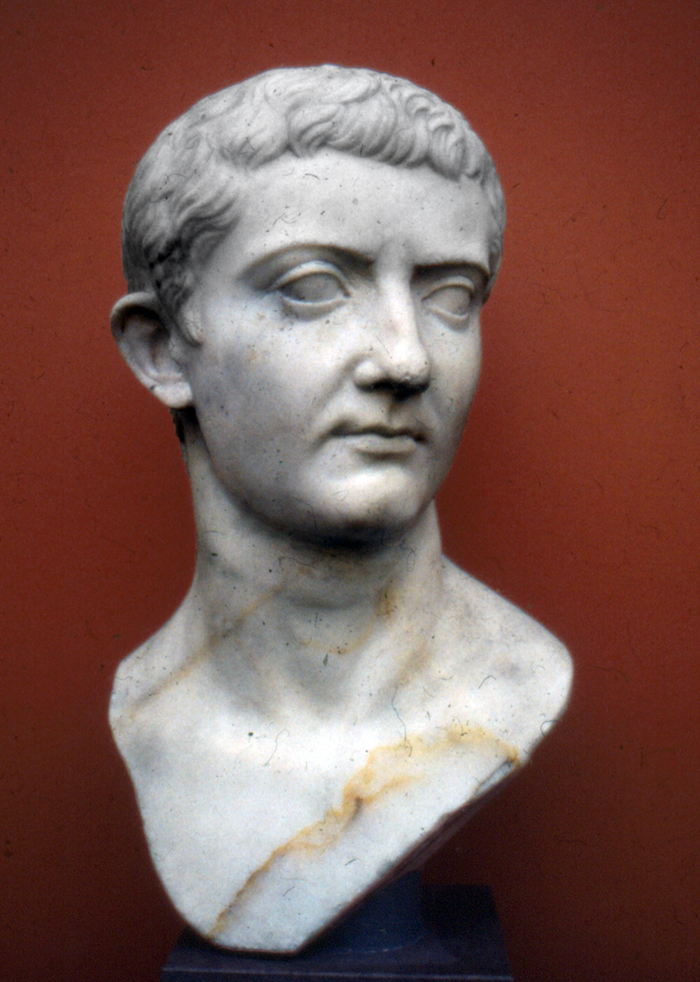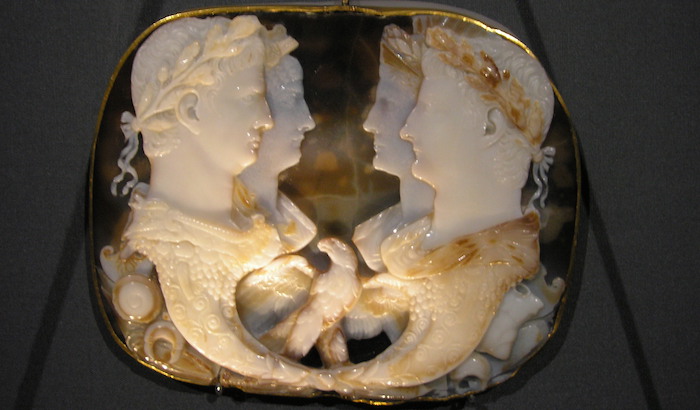Foibles and eccentricities make good NPCs. Quirky characters are memorable, and they give the players something to riff on when interacting with them. The ancient Roman historian Suetonius provides an amazing source for these quirks. His book The Twelve Caesars contains biographies of the first eleven Roman emperors and the proto-emperor Julius Caesar. The book is filled with these amazing personal details you won’t find anywhere else. Suetonius had access to the Imperial archives, and he was near enough in time to these emperors that he still had access to the old court gossip. And because he was writing biography, not history, he devoted as much ink to the character of these emperors as he did to the events of their lives. Let’s take a look at some of the most gameable of these emperors’ personal foibles!
I will omit Suetonius’ reports of some emperors’ excesses in wine and sex because they are, frankly, boring. They’re scandalous, sure, but they really boil down to “so-and-so was a drunk with a debauched sex life.” Much the same can be said about Suetonius’ claims of some emperors’ cruelty. They’re titillating but repetitive, and should be taken with a grain of salt anyway.
This post is brought to you by beloved Patreon backer Justin Moor. Thanks for helping keep the lights on! If you want to help keep this blog going alongside Justin, head over to the Patreon page – and thank you!

Image credit: Marsyas. Released under a CC BY-SA 3.0 license.
We’ll start out with Augustus, the first ‘official’ Roman emperor. This means skipping over Julius Caesar, but since I did a four-part series on Caesar, that seems OK. Augustus was Caesar’s handpicked successor. He expanded the empire, established buffer states to protect it, and instituted widespread political reforms. He also had any competitors for political power executed, and responded to threats with the greatest brutality. In many ways, he’s recognizably akin to a third-world dictator. But Augustus also possessed a great zeal for good governance and almost no ego. He’s a complicated figure, and his legacy remains controversial.
Augustus’ foremost foible was his bizarre humility. Upper-class Roman culture glorified self-aggrandizement, and Augustus’ position as the foremost of them all almost required him to be the most ostentatious braggart in Rome. Instead, he shrank from the title dominus (‘lord’ or ‘master’, as in ‘master owning slaves’) and reprimanded anyone who used it around him. Even his grandchildren could use it only as a joke. His home was modest, mostly undecorated, and he slept in the same bedroom for forty years. Given that humility was not a virtue Romans recognized, Augustus’ behavior wasn’t modest; it was borderline incomprehensible.
His weird humility makes Augustus’ two vanities all the more remarkable! First, he wore platform shoes to make himself look taller. And second, he collected truly unique items, like the weapons of ancient heroes and the bones of what we may infer were dinosaurs.
Augustus also could abide neither heat nor cold. During the mild Mediterranean winters, he wore four tunics and three layers of woolen clothes. In summer, he had to sleep outside while being fanned all night through, and always wore a broad-brimmed hat outside, even when he wasn’t going anywhere.
But Augustus’ strangest foible was the way he treated his daughter, Julia, and her daughter, also named Julia. At some point, Augustus concluded the Julias “had both been engaging in every sort of vice” and exiled them to a tiny island where they were forbidden to drink wine or even look at men. Later, he also ordered the only surviving son of Julia the Elder into exile on another prison island. He called them “my three boils”, and liked to misquote Hector from the Iliad: “Would that I had never married, and died without children.” When Phoebe, a close friend of Julia the Elder, hanged herself, Augustus cried “I would rather have been Phoebe’s father!” When some of the Roman people tried to get Augustus to forgive the Julias, he harangued them, saying, “If you ever bring this up again, may the gods curse you with daughters and wives like mine!”

The next emperor was Tiberius, a sometimes-favorite of Augustus’ whom Augustus adopted as heir after the emperor’s natural-born sons died. Tiberius was an excellent general, but as an administrator he was negligent, and as a politician he was bloody-handed and ruthless. Upon ascending to the metaphorical throne, he exceeded Augustus’ habit of un-Roman humility, where before Tiberius had pursued honors and awards to the same extent as his peers.
Tiberius was a miser. He served yesterday’s leftovers at his big parties, paid his staff well below the usual rate, and charged his friends for the privilege of knowing him. He bullied a rich man into naming him his sole heir and committing suicide. He found wealthy men in the provinces who kept their cash on hand rather than spending it and charged them with planning to use the cash to hire soldiers and rebel – all so Tiberius could confiscate the fortunes of these men. When the King of Persia was dethroned and fled to the Roman Empire with his treasury for protection, Tiberius had the Persian king killed so he could take the treasure.
Tiberius also suspected his mother of trying to be co-ruler beside him. His ingratitude is all the more remarkable because she got him the throne in the first place! Tiberius’ mother Livia married Augustus after she had Tiberius and always patched things up between the two of them when they hit a rough patch in their mentor-mentee relationship. Whenever Livia was active in political life in Rome (for instance, organizing the response to a fire), Tiberius resented it. Their adult relationship consisted largely of quarreling, and he didn’t attend her funeral.
He did, though, deeply love his first wife, Vipsania. Their marriage was a happy one until Augustus made Tiberius divorce Vipsania so he could marry Augustus’ daughter Julia the Elder. Tiberius only saw Vipsania again once, at a distance, and began to cry. His staff took precautions to ensure it never happened again.
Tiberius had a great love of mythology and expanded his knowledge by grilling professors of Greek literature on points Suetonius finds trivial: “Who was Hecuba’s mother?” “What name did Achilles go by at the court of King Lycomedes?” “What song did the sirens sing?” He even re-instituted religious rituals mentioned in certain myths that folks believed had not been practiced in a thousand years.
Despite his fondness for stories about the gods, Tiberius had a great fear and suspicion of prophecy. He forbade anyone from consulting a soothsayer unless there were witnesses present to testify to any funny business. He tried to shut down all the oracles near Rome, but called it off out of fear of a sacred fortune-telling instrument he had confiscated from a nearby temple.

Image credit: Gryffindor. Released under a CC BY-SA 3.0 license.
I’ve written before about the death of Tiberius’ successor Caligula, and how various authors’ claims of Caligula’s madness and cruelty are suspect. Since Suetonius offers us no foibles for Caligula except his excesses, we jump right over him to his successor, his uncle Claudius.
Nobody ever intended that Claudius would become emperor. It was an accident brought about by poor planning by both Caligula and his assassins. It shouldn’t be a huge surprise, then, that Claudius was just sort of a regular guy. As a boy, he was often sick. Interpersonally, he came across as a dummy. Even though he was born into the imperial family, his older relatives hesitated to appoint him to public positions, for fear he’d embarrass them. After he stumbled his way onto the throne, Claudius’ wits seemed to sharpen and he claimed it had all been an act to make him seem non-threatening and keep him alive. But even as emperor, Claudius acted pretty much like you or I would, like a regular dude rather than a Great Man of History. It’s almost endearing.
Claudius was famously absent-minded. He’d forget he had people executed and wonder why they were absent. He’d forget simple historical facts. When addressing the Senate, he’d lose track of the business of the day and go off on long-winded rambles about nothing in particular. The way he treated people wasn’t based on cold political calculus, but on whether they were kind to him before he was emperor. He probably wasn’t a very good power-player, but he was very much like your relatable old grandpa.
In a similarly eccentric vein, Claudius invented three new letters and added them to the Roman alphabet. They represented sounds that were present in Latin, but had no letter. By way of analogy, think of the English ‘th’ sound, which has no single letter to represent it – or the glottal stop represented by the two ’t’s in the middle of ‘button’, which also has no letter of its own. The use of these three new letters did not survive the end of Claudius’ reign. Suetonius tells us they could still be found in certain books in his his time and on a few public inscriptions, but implies that no one in his day was writing new content using the letters.
Claudius had a number of disagreeable physical traits. He limped. He stammered. His head twitched to the side. He drooled and leaked at the nose when angry. And he was prone to fits of uncontrollable laughter.
Thanks to the fate of his predecessor – the murder that landed Claudius on the throne in the first place – Claudius was justifiably paranoid. He went everywhere with an escort of heavily-armed soldiers, and had soldiers serve as his servants. When he entered a room, he had the mattresses and pillows prodded for weapons. When callers brought their secretaries to meetings with him, Claudius had each secretary stripped of his sharp writing stylus, so it could not be used as a knife. He even had men executed because other people claimed to have had dreams where that man attacked the emperor. Suetonius claims that at least once someone used this as a convenient way to get a political enemy disposed of. It’s unclear whether these measures kept him safe; there was speculation over whether his death was murder.
Come back next week when we’ll finish out Suetonius’ Twelve Caesars with more NPC foibles!






